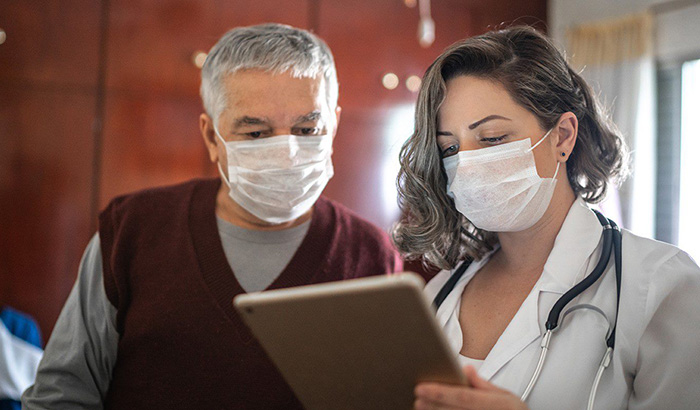Office of Research & Development |
 |


Experts in precision medicine will focus on VA research into mental health, data collection, and translation of research findings into Veteran care. (Photo for illustrative purposes only.)
May 17, 2022
By VA Office of Mental Health and Suicide Prevention
"Precision medicine is an approach which aims to tailor disease prevention and treatment to individuals by taking into account genetic differences."
In October 2020, the Commander John Scott Hannon Veterans Mental Health Improvement Act of 2019 (SHA) was signed into law. SHA Section 305 required the Department of Veterans Affairs (VA) to develop and implement an initiative to identify and validate brain and mental health biomarkers among Veterans. On April 17, 2022, the Office of Research and Development (ORD) and the Office of Mental Health and Suicide Prevention (OMHSP) launched the Scott Hannon Initiative for Precision Mental Health (SHIPMH). As outlined in SHA Section 305, SHIPMH’s focus is to foster and coordinate biomarker research focused on mental health conditions, promote data sharing through the expansion of publicly available deidentified research data, and, perhaps most importantly, translate research findings to clinical care for Veterans.
Precision medicine is an approach which aims to tailor disease prevention and treatment by taking into account differences in an individual’s clinical, lifestyle, genetic, and biomarker information. Within mental health care, precision medicine is in its infancy. In October 2021, ORD and OMHSP convened an Expert Working Group comprised of renowned experts in the fields of mental health, structural, functional, molecular and physiological brain and mental health biomarkers from the VA Mental Illness Research, Education and Clinical Care centers (MIRECCs) and VA Clinical Science Research and Development/Rehabilitation Research and Development (CSR&D/RR&D) research community.
The Expert Working Group outlined a roadmap for success, focusing on research and data collection, data sharing, and translation of research findings into Veteran care. To maximize data collection, VA is leveraging several ongoing research projects to include the Long-term Impact of Military-relevant Brain Injury Consortium-Chronic Effects of Neurotrauma Consortium (LIMBIC-CENC), Translational Research Center for TBI and Stress Disorders (TRACTS), Million Veteran Program (MVP)/MVP-Measures Investigating Neuropsychiatric Disorders (MVP-MIND), Precision Medicine in Mental Health Care (PRIME Care), and an ongoing EEG clinical trial. The goal is to integrate the assessments of LIMBIC-CENC, TRACTS, and sites that have specific mental health-related assessment/biomarker expertise by developing machine learning algorithms to give a complete 360° diagnostic of brain health.
Public data sharing is available via Federal Interagency Traumatic Brain Injury Research (FITBIR) Informatics System and VA Data Commons. In addition, sharing of deidentified MVP genomic and clinical data with VA and non-VA researchers is currently being piloted in the VA Data Commons.
The final critical piece of SHIPMH is the focus on translating current research findings into clinical care. SHIPMH’s first use case is focusing on the use of psychogenetic testing to better manage medication prescription for opioid use disorder. Evidence has shown that Cytochrome P450 2D6 gene metabolizes commonly prescribed opioids. The identification of this gene can inform medical decisions regarding the selection of alternative medications, doses, or monitoring approaches for adverse effects. Currently, the SHIPMH team is aligning additional operational offices, such as Pharmacy, and building the critical infrastructure to support seamless VA clinician medical decision making.
If you’re a Veteran having thoughts of suicide or you know one who is, contact the Veterans Crisis Line 24/7/365 days a year. Call 1-800-273-8255 and Press 1, text 838255, or chat online at http://veteranscrisisline.net/Chat.
VA Research Currents archives || Sign up for VA Research updates